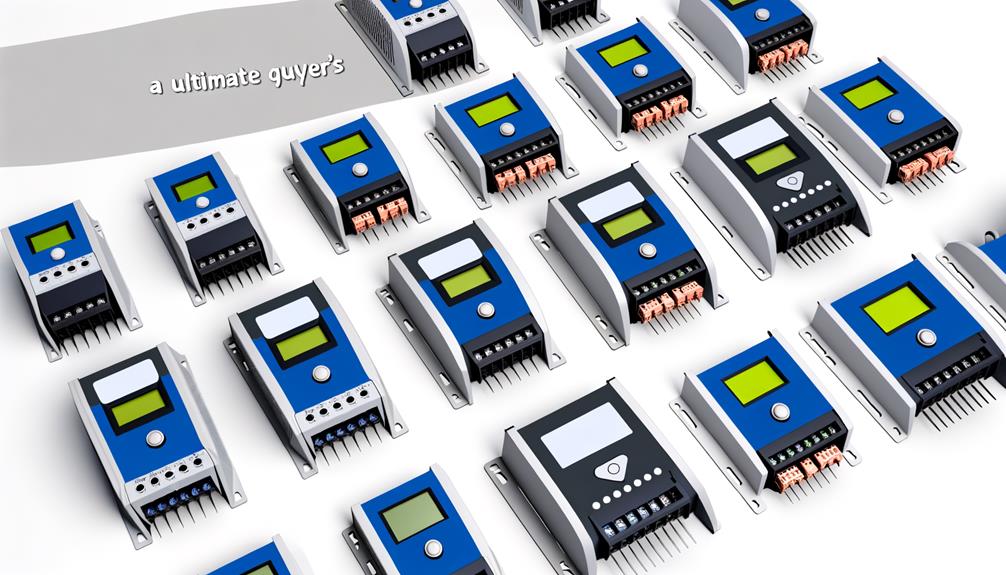Best 12V Solar Charge Controller: Buyer's Guide
When it comes to harnessing the power of the sun to charge your batteries, finding the best 12V solar charge controller is crucial. This small but mighty device acts as a guardian, protecting your batteries from overcharging and ensuring their longevity.
But with so many options available in the market, how do you know which one to choose? What features should you look for? And how can you make sure you’re getting the most out of your solar charge controller?
In this discussion, we’ll explore the world of 12V solar charge controllers and provide you with all the information you need to make an informed decision. So, whether you’re a seasoned solar energy enthusiast or just starting your renewable energy journey, keep reading to discover the best 12V solar charge controller for your needs.
Key Takeaways
- There are two main types of 12V solar charge controllers: PWM and MPPT.
- PWM controllers are more cost-effective and simpler, while MPPT controllers are more efficient and complex.
- MPPT controllers perform better in colder temperatures.
- When choosing a solar charge controller, consider factors such as the type of solar power system, budget, maximum current and voltage rating, and additional features.
Types of 12V Solar Charge Controllers
There are two main types of 12V solar charge controllers: PWM (Pulse Width Modulation) and MPPT (Maximum Power Point Tracking).
A solar charge controller is an essential component of a solar power system as it regulates the flow of energy from the solar panels to the battery.
PWM controllers are cost-effective and simpler, making them suitable for smaller systems with lower power requirements. They work by periodically interrupting the current flow to control the battery charging.
On the other hand, MPPT controllers are more efficient and complex, making them better suited for larger systems. They can convert excess voltage into additional current, maximizing the energy harvested from the solar panels. MPPT controllers also perform better in colder temperatures and have higher charging efficiency.
When choosing between PWM and MPPT controllers, consider factors such as budget constraints, desired charging efficiency, and compatibility with solar panels and batteries.
Factors to Consider When Choosing a Solar Charge Controller
Now that you understand the types of 12V solar charge controllers, let’s explore the important factors to consider when choosing the right one for your solar power system.
- Solar Power System Type: Determine if you need a charge controller for off-grid solar systems or those with battery backup.
- Types of Charge Controllers: Understand the differences between PWM and MPPT controllers, including costs, efficiency, and suitability for different climates.
- Budget Considerations: Consider the cost, efficiency, and compatibility with your solar setup when choosing between MPPT and PWM controllers.
- Maximum Current and Voltage Rating: Ensure that the controller’s current and voltage ratings match your specific solar panel and battery setup.
- Additional Features and Options: Consider features such as built-in Bluetooth for remote monitoring, multiple solar charger compatibility, and warranty coverage.
Considering these factors will help you choose the right solar charge controller that maximizes the efficiency and performance of your solar energy system.
Top Features to Look for in a 12V Solar Charge Controller
When choosing a 12V solar charge controller, it’s important to look for key features that enhance the performance and efficiency of your solar power system.
One important feature to consider is the type of charge controller. There are two main types: MPPT charge controllers and PWM solar charge controllers. MPPT controllers are more efficient, especially in colder climates, as they capture excess voltage and convert it into usable power. On the other hand, PWM controllers are more affordable and suitable for smaller solar arrays.
Another feature to look for is adjustable absorption voltage and float voltage, which allows for flexible battery charging.
Additionally, consider a solar charge controller with built-in Bluetooth for convenient remote monitoring and control. It’s also essential to choose a controller that supports various battery types to ensure versatility in system setup.
Lastly, opt for a solar charge controller with a warranty of 3 years or more for added reliability and longevity.
The Best 12V Solar Charge Controllers for Different Needs
To find the best 12V solar charge controllers for your specific needs, consider the following options from top brands like Renogy, BougeRV, and Victron:
- Renogy PWM Charge Controller: This cost-effective option is suitable for low power needs and offers basic voltage regulation for your solar panels and battery life.
- BougeRV MPPT Solar Charge Controller: Offering higher charging efficiency, especially in colder temperatures, this controller is a great choice for maximizing power output from your solar panels.
- Victron SmartSolar MPPT Charge Controller: With advanced features like Bluetooth connectivity and remote monitoring, this controller provides convenience and control over your solar system.
- Renogy Wanderer PWM Charge Controller: Designed for smaller systems, this controller offers reliable voltage regulation and protection for your battery.
- BougeRV 20A MPPT Solar Charge Controller: Ideal for larger systems, this controller provides high efficiency and compatibility with a wide range of battery types.
Consider your specific needs and budget when selecting the best 12V solar charge controller for your solar system.
Tips for Proper Installation and Maintenance of a Solar Charge Controller
Proper installation and maintenance of a solar charge controller are essential for ensuring the efficient and safe operation of your solar system. Here are some tips to help you with the installation and maintenance of your solar charge controller.
- Ensure proper wiring by connecting the solar panels, battery, and load to the charge controller correctly. This will prevent any electrical issues.
- Mount the controller in a well-ventilated area and avoid direct sunlight to prevent overheating. Regularly inspect and clean the controller for any signs of damage or corrosion, as this will help maintain optimal performance.
- Use appropriate wiring and fuses to ensure safety and efficiency and maintain proper grounding to prevent electrical hazards and ensure effective operation.
- Following these tips will help you get the most out of your solar charge controller.
Frequently Asked Questions
How Do I Know What Solar Charge Controller to Buy?
To know what solar charge controller to buy, consider important features like compatibility with solar panels and types of battery supported. Take budget considerations into account, as well as maximum charging current and protection features. Look for brand reputation, customer reviews, warranty, and after sales support.
How Do I Choose the Right Charge Controller?
To choose the right charge controller, consider key features like maximum voltage, amperage capacity, battery compatibility, temperature compensation, display options, load control capabilities, protection features, installation requirements, and warranty and customer support.
Which Solar Charge Controller Is Best?
The best solar charge controller for you depends on your specific needs. Consider factors like affordability, high efficiency, user-friendly features, and advanced monitoring capabilities. Top-rated controllers are compact, waterproof, and offer multiple charging modes.
What Size 12V Solar Controller Do I Need?
To determine the optimal capacity of your 12V solar charge controller, consider your system requirements, battery compatibility, panel voltage, load current, charge efficiency, maximum power point tracking, temperature compensation, overload protection, and easy installation.
Conclusion
Choosing the right 12V solar charge controller is crucial for protecting your battery and maximizing the efficiency of your solar power system. Whether you opt for a PWM or MPPT controller, consider factors like budget, brand reputation, and additional features like Bluetooth connectivity.
Remember to properly install and maintain your controller for optimal performance. With the right controller, you’ll be able to harness the power of the sun and enjoy reliable, clean energy for years to come.
It’s time to let the sun work its magic and power your world.






